DIRECTOR
> THEATRE | MUSICAL THEATRE | OPERA | SPECIAL PROJECTS
Los Sensuales
(2008)
I was always interested in how time possesses the space. In Dostoevsky this seems to be central. Some of that way of seeing time (associated indissolubly with a space) is foundational in Dostoevsky. This concept seems to be part of his way of seeing the world. Theatre always has to solve this problem. Sometimes music (the art that "dominates" time) may solve this issue and that is why in Los Sensuales music is an indispensable part of the work. Beyond the genre that labelled the show (Melodrama) music here attempts the appropriation of the space through time. Music happens in time and can be heard within a space. Los Sensuales -then – is using music in order to think some space’s laws.
Some time ago I wrote some thoughts about what I dreamed about this show: "Hardiness, untidiness, daylight, no beauty, paroxysm, speed, no silence, fugacity, profanity, genitalia: the cry, the tears, the outside, the absence of interiority, no psychology, no introspection. A wild behaviour. There is no more spiritual connection. Mankind thrown to its sensuality. The animal side. No refinement. Kill the beautiful. And what is “the beautiful”? - The construction of a scaffold that no longer holds anything. Theatre abandons his walls”.
These 'words', that attempt to build a landscape, have the intention to construct a language: the silent partition of this work.
Alejandro Tantanian
-
Los Sensuales (The Sensual Ones)
Melodrama by Alejandro Tantanian -
with
Ciro Zorzoli
Teodoro Tigrov, father, brutally murdered at the beginning of this melodramaTigrov’s House
Odille Malheur & Teodoro Tigrov’s children
Sonja Tigrov, Mijail’s twin sister, motherless child, abandoned by her father 21 years agoMirta BogdasarianMijail Tigrov, Sonja’s twin brother, motherless child, abandoned by her father 21 years ago
Diego Velázquez
-
Richardson’s House
Margaret Richardson & Teodoro Tigrov’s children
Alex "Dumby" Richardson, the elder, son of the possessed, so called because of the nickname that during his birth was given to Margaret Richardson.
Pablo Rotemberg - Damien "Stinky" Richardson, the middle one, son of the idiot, so called because of the nickname that during his birth was given to Margaret Richardson.
Javier Lorenzo -
William "Muddy" Richardson, the younger, son of the dead woman, so called because Margaret Richardson died when he was born
Nahuel Pérez Biscayart -
Malheur’s house
Odette Malheur, Odille’s twin sister, Lise & Alberto’s sister, aunt of Tigrov’s twins and Teodoro Tigrov’s lover at the moment of his death.
Stella Galazzi -
Lise Malheur, Alberto’s twin sister, sister of the twin sisters Odette & Odille (already dead) and Tigrov twins’ aunt.
Gaby Ferrero -
Alberto Malheur, Lise’s twin brother, brother of the twin sisters Odette & Odille (already dead) and Tigrov twins’ uncle.
Luciano Suardi -
Photos
Ernesto Donegana -
Graphic design
Go Up! Group -
Press
Duche & Zárate -
Assistant director
Mariano Stolkiner -
Second assistant for set and costumes
Cecilia Stanovnik -
Assistant choreography
Silvina Duna -
Vocal training
Sebastián Holz -
General assistant
Martín Tufró -
Executive production
Romina Chepe -
Artistic collaboration
Nicolás Schuff & Martín Tufró -
Musicalization
Pablo Rotemberg, Alejandro Tantanian & Diego Velázquez -
Songs lyrics
Alejandro Tantanian -
Lyrics from Teodoro Tigrov’s song
Martín Tufró -
Songs music
Diego Penelas -
Choreography
Pablo Rotemberg -
Lights
Jorge PastorinoSet and costumes
Oria Puppo -
Direction
Alejandro TantanianRunning time: 105 minutes.
Premiere: May 16th, 2008, Camarín de las Musas, Buenos Aires, Argentina.

Photos: Emilio Gutiérrez & Ernesto Donegana
-
Work chosen as one of the Best Shows of the season by the INT (National Theatre Institute)
Nominee in four categories for the Teatro del Mundo Awards 2008 and in two categories to the Clarin Awards 2008, including: Best Show, Best Original Music (Diego Penelas), Best Author (Alejandro Tantanian), Best Light Design (Jorge Pastorino) and Best Photography for Theatre (Ernesto Donegana).